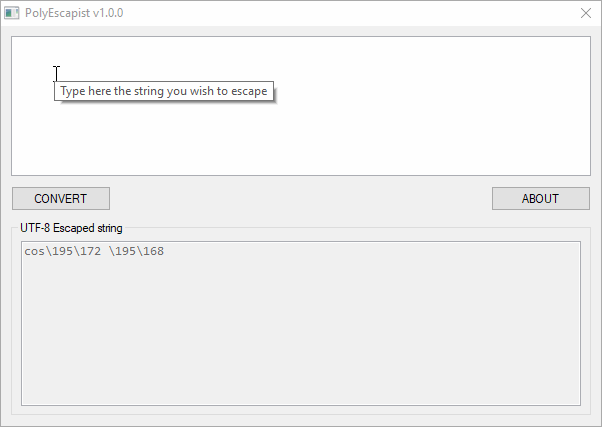-
Notifications
You must be signed in to change notification settings - Fork 9
PolyTools
PolyTools 2018/01/24 | Polygen 1.0.6
A freeware collection of tools for working with Polygen.
ITALIAN VERSION: https://github.com/tajmone/Polygen/wiki/PolyTools
Table of Contents
PolyTools is a collection of freeware tools for working with Polygen:
More tools are on their way, including a Polygen graphic user interface.
PolyTools, Copyright (C) Tristano Ajmone, 2018.
PolyTools are freeware applications and you are free to copy and redistribute them by any means at the condition that you don't charge a fee for it. You may distribute the PolyTools collection as a whole, or any of its tools individually, but their license file must always be included in the copies you distribute. You can't sell, modify or reverse-engineer any of the PolyTools applications.
PolyEscapist is a tool to convert Unicode strings to UTF-8 escaped strings for use in Polygen grammars. It uses a smart algorithm to match the escaping rules of Polygen and create optimized strings which can be pasted directly in your grammar source files, making it easy to write production rules containing Unicode characters.
You can paste or type in the input field (multine supported), then click on the CONVERT button and the source Unicode string will be converted to a Polygen-compliant UTF-8 escaped string, and automatically copied into the clipboard:

The string parser is smart and follows Polygen v1.0.6 rules:
- Natively supported Ascii character are not escaped (except
£1) - Characters which have a corresponding Polygen escape sequence are rendered as escape sequences (eg:
\r,\n,2\\,\",\t, etc.) - Everything else is Ascii-escaped to the equivalent UTF-8 bytes representation
NOTE1 — The pound sign (
£) is considered by Polygen a valid character inside grammars strings, and will represent it in the output as character 163 — which would cause a parsing error in applications expecting UTF-8 input because byte 163 (0xA3) is not a valid Ascii character. Therefore, PolyEscapist will escape£to its UTF-8 representation ("\194\163").
NOTE2 — New line characters (EOL) in multiline strings will always be represented in the native OS EOL convention (on Windows:
CRLF→ "\r\n") because the input control in the interface (as well as the clipboard system functions) will handle EOL sequences natively, regardless of the EOL sequence in the original copied text.
These are the links to the latest precompiled binaries of PolyTools:
-
PolyTools-windows_2018-01-24.zip— PolyTools for Windows
Currently, only Windows binaries are available. Linux binaries should be made available soon (need time to tweak the code and test it). As for macOS binaries, I'm looking for a solution.
È disponibile la versione Italiana del Polygen Wiki!